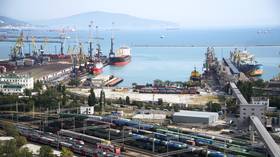West ‘seriously underestimated’ Russia’s economic clout – report

Western sanctions have failed to sink the Russian economy due to a “big country trap” effect, a recent study by the Institute of Economics of the Russian Academy of Sciences has found.
If a state is a major player on the global market – like Russia – the imposition of restrictions on its exports will inevitably backfire, leading to a surge in global prices, the researchers noted, referring to the Western embargo on Russian seaborne oil supplies.
The sanctions on Russian oil introduced by the G7 and EU late last year were conceived as a means to curtail Moscow’s energy revenues without causing a spike in global energy prices. In reality, however, they have had a boomerang effect. Soaring crude prices have helped Russia financially offset a decline in supplies, putting “formal effectiveness” of the sanctions in contradiction with their “strategic effectiveness,” the study said.
Russia’s monthly revenues from crude exports are reportedly higher than before the start of the military operation in Ukraine, with net oil revenues hitting $11.3 billion in October, according to Bloomberg’s calculations. The restrictions have led to a reshaping of the financial architecture of the oil and maritime trade and a change in the “pricing environment” of global markets, Alexey Kostin, an associate professor at Moscow’s Financial University, suggested. In response to the sanctions, Russia has “successfully” diverted most of its energy exports to Asia – particularly to India, China, and Iran, where the country’s oil has been sold well above the West’s $60-per-barrel price cap, the expert said.
Attempts to lock down the world’s key exporter only lead to a destabilization of the market, Maksim Maksimov, an associate professor at the Plekhanov Russian University of Economics, explained. He added that Western nations have “seriously underestimated” Russia as a global economic player. There are no solutions that could dramatically reduce Russia’s income from exports, he concluded.
Any new restrictions are unlikely to have a sizable impact on the Russian economy, a member of the business union Delovaya Rossiya, Aleksey Khizhnyak, said, commenting on the latest ban on Russian diamonds announced by the European Council (EC). Kremlin spokesman Dmitry Peskov said last week that the diamond embargo was “predictable,” emphasizing that “there are ways to circumvent these sanctions, and they will be realized.”
For more stories on economy & finance visit RT's business section














